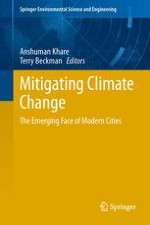2013 | OriginalPaper | Buchkapitel
European Citizens, Carbon Footprints and Their Determinants—Lifestyles and Urban Form
verfasst von : Vera Peters, Fritz Reusswig, Corinna Altenburg
Erschienen in: Mitigating Climate Change
Verlag: Springer Berlin Heidelberg
Aktivieren Sie unsere intelligente Suche, um passende Fachinhalte oder Patente zu finden.
Wählen Sie Textabschnitte aus um mit Künstlicher Intelligenz passenden Patente zu finden. powered by
Markieren Sie Textabschnitte, um KI-gestützt weitere passende Inhalte zu finden. powered by
